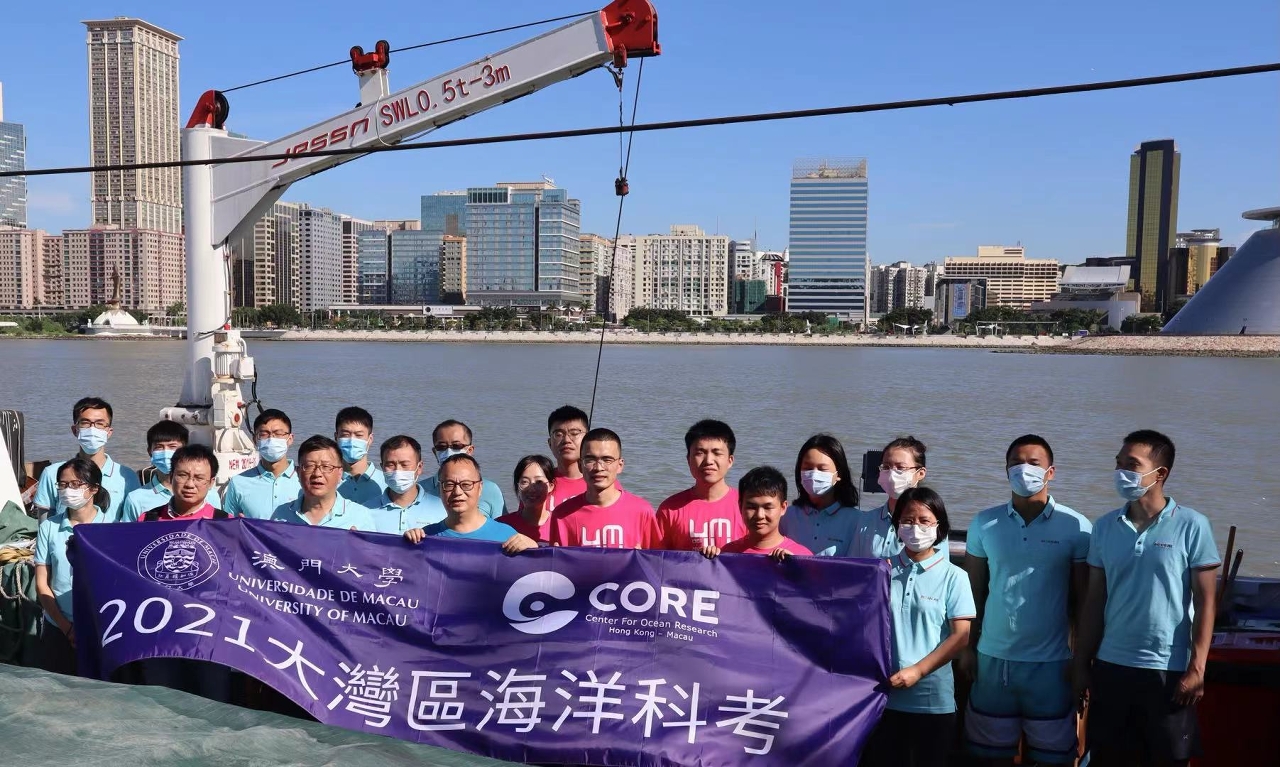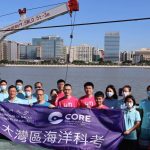 Researchers from UM, HKUST and XU launch their first summer marine research expedition to the Greater Bay Area. The fourth from right in the first row is UM Rector Yonghua Song.
Researchers from UM, HKUST and XU launch their first summer marine research expedition to the Greater Bay Area. The fourth from right in the first row is UM Rector Yonghua Song.
The University of Macau (UM) has been putting extra efforts in the education and research in regional oceanology, in view of Macao’s robust demand for technologies to use the ocean, prevent and control marine disasters and the protect the marine environment, says UM Rector Yonghua Song, adding the university focuses on offshore civil engineering, the marine environment and ocean ecology, as well as marine disaster prevention and control.
‘We hope to help the Macao SAR government address the challenges in the use of the ocean, in the prevention and control of marine disasters, and in the protection of the marine environment. So we have identified regional oceanology as a key research area. We train young researchers and focus on emerging topics with an interdisciplinary approach. In fact we have made regional oceanology an important part of its ‘3+3+3+3’ strategic research blueprint,’ Song says.
Prof Hannah Zhou Wanhuan, head of the Department of Civil and Environmental Engineering and interim head of the Centre for Regional Oceans, focuses on systematic monitoring, life cycle assessment, and smart maintenance of coastal buildings and sea-crossing clusters. Her team also develops smart monitoring systems and professional simulation analyses to address a variety of disaster-causing factors, such as major natural hazards like typhoons, durability of marine structures, and settlement of reclaimed land. Their work aims to provide life cycle risk assessment and maintenance decisions for the safety of major infrastructure projects and civil engineering works in service. According to Prof Zhou, as many marine projects affect water quality, marine ecosystems, and marine biodiversity, UM is working with government departments and companies to evaluate the actual effectiveness of marine projects and to promote research synergies in the fields of offshore environmental ecology, urban natural disaster prevention and control, and ocean engineering.
UM is also conducting research on atmospheric pollutant detection, experimentation, and modelling, as well as research on water quality monitoring, sewage treatment, and water resources. Associate Professor Li Yongjie of the Department of Civil and Environmental Engineering says that because Macao is located in the west of the Greater Bay Area, the his team is studying the emission and transformation of pollutants in the atmosphere, water bodies, and other ecosystems, as well as observing the migration and transformation of pollutants in Macao due to the influence of maritime air masses. In addition, since the salinity of Macao's coastal sewage is relatively high, his team is also studying how to effectively treat high-salinity wastewater, including how to recover resources for fertiliser and other useful substances from the sludge produced during the wastewater treatment process. And they will also work with neighbouring research institutes to monitor the changes in water quality in the region to ensure that Macao's water meets drinking water standards.
Assistant Professor Gao Liang of the Department of Civil and Environmental Engineering and other researchers have developed numerical models to simulate the processes of these disasters: ‘We have been able to simulate estuary-scale storm surges and astronomical tides, and we can calculate storm surge and tide level changes for each typhoon, the model can simultaneously calculate the hydrodynamic processes in the drainage systems and display them in 3D to anticipate possible disaster scenarios and take targeted measures.’She adds that the drainage system in the Macao Peninsula is relatively old and sometimes becomes clogged . ‘Based on the findings of our study, we will recommend the construction of additional pumping stations or more efficient rising mains and underground storage tanks for faster drainage of storm water, we will also draw on the experience of other cities in storm water management and propose a number of measures, such as upgrading the design standards for sea walls and breakwaters to minimise flood damage.’



